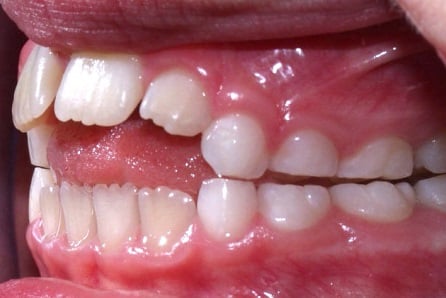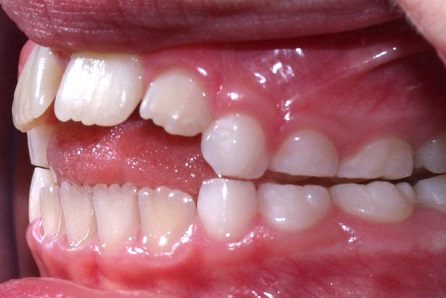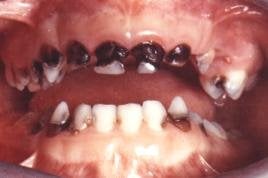BABY TEETH: Important or Not?
There are only two body parts that are DESIGNED to be lost: the umbilical cord baby teeth Some people MISTAKENLY believe that because baby teeth...
3 min read
Dr. Joanne Baldos and Dr. Adam Szymczak : Dec 22, 2018 11:41:27 AM

A: It's a natural process!
We are genetically programmed to have a sucking reflex, without it infants would not be able to breastfeed. Infants will instinctively suck anything placed in their mouth.
Infants quickly learn that sucking not only provides food, but it is also pleasant and comforting. As such most infants are involved in finger sucking, most commonly thumb sucking.
A: Yes!
Thumb sucking is a normal and healthy aspect of an INFANT’S development. Thumb sucking is a source of self-soothing and helps infants fall asleep.
A: It depends! Reasons Why Parents Shouldn't Be:
Thumb sucking can have negative effects, the most significant of which are the effects on the development of the adult teeth and the growth of the upper jaw bone.
Thumb sucking will NOT effect teeth and jaw bone IF the thumb sucking is:
A parent should not be concerned about the effects of thumb sucking on the BABY TEETH. As long as the thumb sucking habit stops before the adult teeth come in, any effect on the baby teeth will NOT carry over to the adult teeth.
Almost all thumb-suckers and finger-suckers will stop on their own by the age of four. Treatment should NOT be attempted before the age four!
The adult teeth start to come in around the age of 6. IF thumb sucking is:
AND your child is over the age of 4, plan the weaning process so that the habit is stopped before the time the first baby tooth is lost.
A: It depends! Reasons Why Parents Should Be:
THUMB SUCKING TEETH: THE EFFECT ON THE ADULT TEETH AND UPPER JAW BONE:

IF the thumb-sucking habit is not stopped by the time the first baby tooth is lost:
These severe changes can cause speech and swallowing difficulties. Furthermore, many children will be teased by their peers due to their unaesthetic appearance and for continuing an “immature” habit of thumb-sucking.
The use of a safety-approved pacifier is recommended. It is easy to take away a pacifier during the weaning process between the ages of 4 and 6. It is illegal to take away a child’s thumbs! A child uses the pacifier for soothing instead of fingers.
Things to keep in mind regarding pacifiers:
Weaning: “to detach from a source of dependence”.
Your child has become dependent on sucking for comfort, pleasure and self-soothing. Observe what triggers your child to suck their thumb or pacifier and provide them comfort so that they don’t have to resort to their old habits. Praise your child for not sucking their thumb or pacifier.
Get your child involved in stopping the habit by recording incidents of sucking in a calendar. Reward your child weekly for improvements. Explain why it is important to not continue this habit, show pictures of what will happen to the teeth if the habit continues beyond the age of 6.
There are other methods (often ineffective) to break the habit ( use with caution!):
putting a sock or mitten over the hand and taping it securely during sleep
There are many products on the market readily available on the internet. Keep in mind WEANING from sucking a thumb or pacifier is NOT about buying a product it is about helping your child with their emotional regulation which is best achieved by positive re-enforcement and guiding your child through this transition as described above.
Shaming and negative reinforcement should not be used.
A six-year-old or older child is causing or has often already caused damage to the adult teeth.
A child who has not shown improvement using the calendar and positive reinforcement must not feel like they have failed or are being punished with the thumb sucking appliance.
The use of a “palatal crib” is the final alternative that is almost always successful. The “palatal crib” should be explained to a child as a device that will act as a reminder to keep the thumb out of the mouth. This appliance, constructed by a dentist, acts as a suction breaker reducing the value of sucking.
Treating thumb-sucking teeth involves extensive orthodontic treatment (braces).
It is best that thumb-sucking teeth be prevented.
KIDS DENTIST: Top 7 MISTAKES PARENTS MAKE in Helping Kids with Oral Health
DENTISTRY FOR CHILDREN: Preventing Dental Problems in Children
In the best interest of your health and well-being,
Dr. Joanne Baldos and Dr. Adam Szymczak

There are only two body parts that are DESIGNED to be lost: the umbilical cord baby teeth Some people MISTAKENLY believe that because baby teeth...

Root canals have a bad reputation. When a dentist says “You need a root canal”, the most common response from a patient is :( We searched the...
![[2022] Free Dental Care in Alberta: The Complete Guide](https://www.smilecaredental.ca/hubfs/Alberta%20Health%20Services.png)
If you are looking for free dental care in Alberta, you have come to the right place.